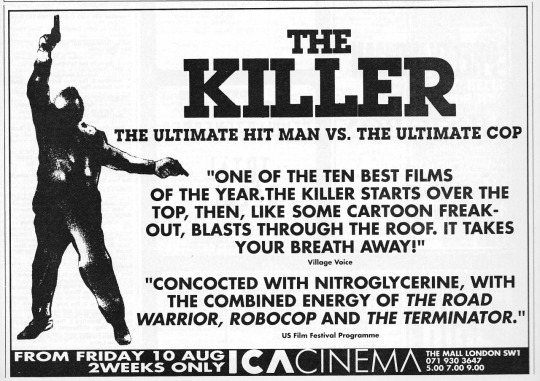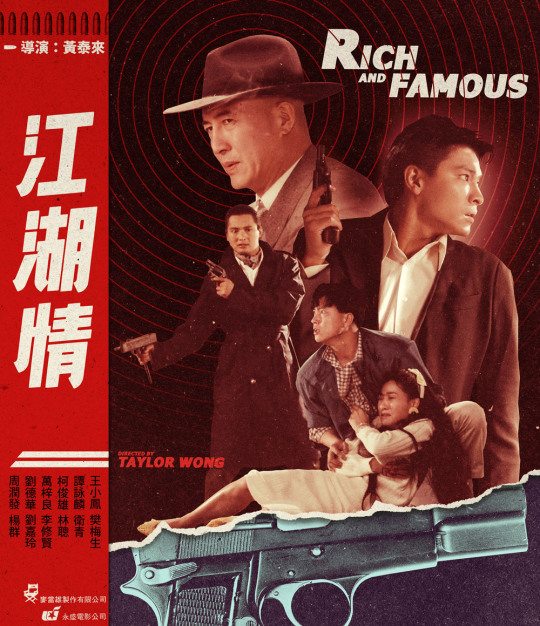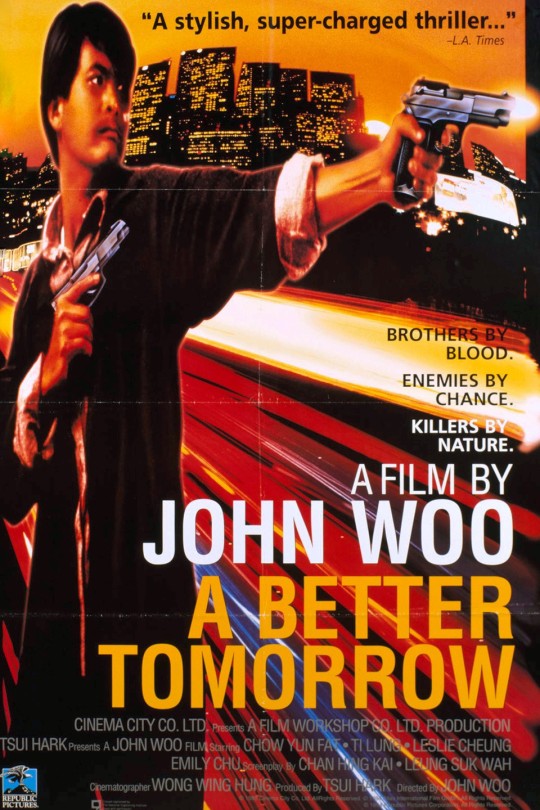#heroic bloodshed
Explore tagged Tumblr posts
Text
Happy Birthday to the legendary John Woo! Hard Boiled - Dir. John Woo
21 notes
·
View notes
Text

Newspaper ad for John Woo's The Killer (1989)
137 notes
·
View notes
Text

#wanted#james mcavoy#gung-fu#gun fu#guns firearms#heroic bloodshed#wanted 2008#movies film cinema#action
13 notes
·
View notes
Text

There’s a reason they call this sub genre “bullet ballet.”
The True Hero (1994)
#The True Hero#Bullet ballet#Heroic Bloodshed#Hong Kong action#Hong Kong action cinema#Hong Kong cinema#Gif#Gifs#Action movie#Action movies
46 notes
·
View notes
Text




Rich and Famous) (Taylor Wong, 1987) & Tragic Hero) (Taylor Wong, 1987 | Covers for the Blu-ray boxset by Eureka Entertainment | Cover design by Gokaiju
#rich and famous#Taylor Wong#Tragic Hero)#英雄好汉#江湖情#heroic bloodshed#andy lau#chow yun fat#gokaiju#grégory sacré#eureka entertainement#blu ray
14 notes
·
View notes
Text
Film Review: The Replacement Killers
When Chow Yun-Fat came to the US, he brought a reputation from various Heroic Bloodshed epics, from John Woo and Ringo Lam – a reputation as an action star with a strong acting range. So, it’s unsurprising that his early roles would fall into that same category, with The Replacement Killers doing a film in that style, but with some admittedly more Hollywood sensibilities. Continue reading…

View On WordPress
4 notes
·
View notes
Text

Norman Chu Siu Keung
1985’s “Hong Kong Godfather”
#Norman Chu#shaw brothers#hong kong#hong kong cinema#hong kong action#guts and glory#blood and guts#heroic bloodshed#1985#1980s movies
0 notes
Text
Happy 77th Birthday to legendary filmmaker John Woo! ^__^
#geek#film#blog#happy birthday#filmmaker#john woo#a better tomorrow#the killer#hard boiled#hard target#face/off#face off#heroes shed no tears#hong kong cinema#asian cinema#action movies#heroic bloodshed#pop culture icon#living legend#geek with clip ons#i review stuff#irs#last hurrah for chivalry#mission impossible 2#1970s cinema#1980s cinema#1990s cinema#90s action movies
1 note
·
View note
Text
the thing about heat (1995) is that almost all of its Big Pathos Moments were “having ties to the world of crime, from either side of the law, makes it impossible for you to have an honest and faithful relationship with a woman.” and they were done very well! and they all contrasted each other nicely. but a good hong kong heroic bloodshed film will have one of those, then go “it also makes it impossible for you be truly filial to your father. it also makes it impossible for you to be a good student to your mentor. it also makes it impossible to be a caring older brother guiding your younger siblings. it also makes it impossible to be a loving father supporting your children.” they’ll go through the checklist of confucian relationships and unravel each one before your eyes, and then they’ll conclude with “beg for redemption if you want. kill yourself for it if you have to. but whether you get that redemption or not, you will always be able to give and receive the friendship of your sworn brothers.” and i don’t know. that just feels like a more complete diet of killing me than watching four marriages disintegrate in a row
#i specify hong kong heroic bloodshed because for all the love i have for japanese and south korean heroic bloodshed/organized crime films.#they do not do this#anyways#ryddles
31 notes
·
View notes
Text
The recurring theme that mercy ultimately leads to more death and ruthlessness is mercy upon yourself. Odysseus spares the cyclops and 500 of his men die. Eurylochus spares Odysseus and he and the remaining crew perish in the waves.
#aaaaaahhhhh#but also the converse theme#that ruthlessness and vengefulness#only lead to more bloodshed#so what do you chose?#what do you do when the world is against you and the gods order that you kill the ones you love?#or die yourself#do you take the heroic route?#be the martyr#or do you take the selfish route#preserve yourself#because you so desperately don’t want to die#you so desperately want to see your family again#trin rambles#epic thunder saga#epic the musical
41 notes
·
View notes
Text
i need german cheung man-kit to 紅 in the next few years as a real action film lead. or else
#john wick style or something something heroic bloodshed gratuitous bloodbath film for him to star in pls#he has the skill he has the looks he has the dedication#german cheung#ashton originals
3 notes
·
View notes
Text
"When I made 'Hard Boiled' (1992), I had no idea that it would be released to an international audience. I just wanted to make a film to team up my two favorite actors, Tony Leung and Chow Yun-Fat." --- John Woo
27 notes
·
View notes
Text

A Better Tomorrow (1986)
#movies#posters#a better tomorrow#john woo#heroic bloodshed#chow yun fat#ti lung#leslie cheung#waise lee#tsui hark
46 notes
·
View notes
Note
Atheist here asking questions about the Moses story, could g*d have found a better way of punishing the pharaoh then killing their children? I feel like there could have been better options?
Mostly I’m curious as to what the interpretation of that is.
well I'm an atheist as well so keep that in mind, but I have no idea.
the story is from thousands of years ago, and many stories from that era include bloodshed (in ways we in the modern world may consider unnecessary).
you have to keep in mind that this punishment was the last one of 10, after 9 other plagues to pressure the pharaoh to release the Israelites. those were: turning the river to blood, a bunch of fucking frogs everywhere (or a giant frog, jumblr had a debate about it), lice, invasion of wild animals, a disease on their livestock, scabies, hail, locusts, and total darkness for three days.
Moses went to Pharaoh after every plague, but he didn't budge until the last one, the death of the firstborns in eygypt. and even after he agreed, he changed his mind and sent his army after the escaping Israelites (which lead to the miracle of the parted sea).
that was not Moses's decision to kill the firstborns, the Israelites didn't cheer for their deaths, and we don't celebrate it. I'd like to remind the audience at home of the start of the story, where the Israelites where slaves to the Egyptians, and the (previous) Pharaoh passed a law to throw every male baby to the nile river, that was a human decision enforced by humans.
many other cultures have their fair share stories of bloodshed being presented as good or even heroic, Judaism shouldn't be expected to be an outlier when it's one of the more ancient religions. not to mention the 10 plagues were never really presented as positive in my opinion, they were a necessary evil to free them from slavery.
thanks for the ask! i hope my answer makes sense. again I'm not religious so I may have gotten some things wrong.
448 notes
·
View notes
Text
One of the most important bits of dialogue in hotd is from Viserys in 1x01:
"The idea that we control the dragons is an illusion. They're a power man should never have trifled with. One that brought Valyria its doom. If we don't mind our own histories, it will do the same to us."
This is a man who bonded with Balerion, The Black Dread, the oldest dragon who had actually hatched in Old Valyria. This was the same dragon who flew Princess Aerea, a 12-year-old girl who bonded with him, back to Valyria against her will - sickening and killing her in the process (Fire & Blood, p 263). The little girl was away from her home at the time and probably feeling "I want to go home" but what Balerion did with that feeling killed her. His will was strong and his memory was *deep*.
Viserys only rode him one time, his inaugural flight, and then never again. IMO he experienced something bonding with that ancient beast that--in addition to studying the family's history and Valyrian lore--convinced him of the danger and fundamentally uncontrollable nature of dragons.
It is totally in keeping with canon events that Vhagar, in the current timeline the most ancient dragon alive--a dragon who drank deep of bloodshed and war with Visenya during the Conquest and *likes* war--translated Aemond's anger at Lucerys into murder of the boy and his small dragon. It is perfectly in keeping with what the show has been saying since episode 1.
An ancient, powerful and wilful dragon overcoming the will of its rider is *literally canon*. Princess Aerea must have been terrified during the whole, long flight to Valyria, and yet all her protests couldn't stop the dragon she'd bonded to.
I would also say that the Valyrians turned magical creatures, dragons, into weapons of warfare - that the dragons, in that sense, represent war. And the show is imo fundamentally antiwar - so here war is something you cannot control. GRRM has said the dragons are "nukes," which fits with this reading:
“Dragons are the nuclear deterrent, and only [Daenerys Targaryen, one of the series’ heroines] has them, which in some ways makes her the most powerful person in the world,” Martin said in 2011. “But is that sufficient? These are the kind of issues I’m trying to explore. The United States right now has the ability to destroy the world with our nuclear arsenal, but that doesn’t mean we can achieve specific geopolitical goals. Power is more subtle than that. You can have the power to destroy, but it doesn’t give you the power to reform, or improve, or build.” (source)
War and nukes - you cannot aim them only at the guilty, only at those you hate; you cannot prevent them from consuming the innocent as well. They a raging fire that consumes, that is all. And so, on that level, I just adore what they're doing and how it all fits together.
Aemond's domestic violence fits too - boys go to war thinking it will be honorable and manly and they'll protect "their women" but instead come home and hurt those very women. This thing burns and burns until it is exhausted, and it doesn't stay contained, not within you or outside you. "So it goes," to steal a phrase from antiwar writer Kurt Vonnegut.
The reason I keep coming back to my antiwar reading of the show is that things that people dismiss as "bad" or mock actually come together beautifully if you don't expect to war to be glorious and masterful and heroic. If you take the text seriously, in terms of what the dragons are metaphorically and what characters have outright said about their fundamentally uncontrollable nature. The lore supports what Vhagar did! That she could overcome a teenaged human's will with her century old bloodlust.
180 notes
·
View notes
Text
i still don't understand why people consistently call wyll naive.
like, huh? how is he naive?
i cannot for the life of me think of a single line of dialogue or narration that either explicitly or implicitly paints wyll as someone who is naive – as someone who thinks everyone an be saved, that they'll win no atter what, as someone who blindly trusts everyone they come across. there is no action he takes in the game that is done out of naivety, and he is in no way an overly trusting person.
where did the idea that he's naive come from? is it just because the people who call him that haven't bothered to interact with him even a little bit, and the only thing they know about him is that he's good, kind, and heroic and therefore they automatically assume he must be naive. as if wyll isn't kind, good, and heroic because of his upbringing, stories of his father's heroics, and most importantly in spite of the horrors and bloodshed he's been through?
it's just so weird to me.
wyll has flaws. he has a tendency to put others before himself – someone else put it better by writing that he thinks "it only hurts me" when making decisions. he worries quite a lot and has trouble taking it easy and relaxing, as seen at the tiefling party and his romance line "so much shadow around us. to think i almost missed the light". he's also a very forgiving person, even towards people who don't deserve his forgiveness – at least not the swiftness with which he doles it out. he's also very angry, but i don't really consider that a flaw because he keeps it in check in a way where it never leads to anything engative happening.
but none of those flaws are connected to him being naive. those flaws stem from him being kind and empathising a great deal with those around him. he's aware of the sacrifices he makes.
he's a folk hero, not a child who hasn't yet learned of the hardships of the world.
he has seen horrors beyond comprehension, seen families ruined by death, sold his soul to save a city for crying out loud, something he talks about quite extensively. it's kind of his whole thing.
when he talks about his deal with the mizora, he doesn't talk like he's surprised to find that it actually isn't very nice to be in a contract with a devil – he's not stupid, he knew what he signed himself into. he knows how the world works. he is kind in spite of it, not because he doesn't know of it.
i don't really have a conclusion to this, i'm just annoyed that people insist on mischaracterising wyll in the laziest way possible.
169 notes
·
View notes